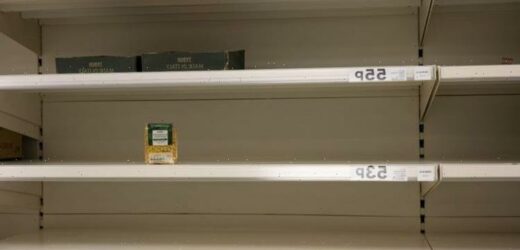Kwasi Kwarteng says gas prices are ‘global issue’
We use your sign-up to provide content in ways you’ve consented to and to improve our understanding of you. This may include adverts from us and 3rd parties based on our understanding. You can unsubscribe at any time. More info
Supply chain shortages, the HGV driver crisis and inflation has already prompted food shortages and raised the price of some goods. According to the Office for National Statistics (ONS), one in six adults in the UK haven’t been able to buy essential food items in the last fortnight. All the while, Britons are also having to cope with the energy crisis that is putting major suppliers out of business and threatening another rise in bills.
Business Secretary Kwasi Kwarteng has not committed to any additional Government help for businesses struggling while the gas crisis causes chaos in the industry.
Now there are fears that more shutdowns are on the way.
David Dalton, of the British Glass Manufacturers’ Association, told the Sunday Times more companies were only “days” from having to close temporarily.
Peter Stefanovic, a lawyer and outspoken critic of the Government, commented on Twitter: “Energy costs are rising and suppliers at risk of collapse.


“Factories are days from shutdown over gas prices.
“Shoppers face empty shelves and have been told to get used to higher food prices.”
He was referring to comments made by Miguel Patricio, the boss of Kraft Heinz.
Mr Patricio admitted the firm is “raising the prices” of products including ketchup and baked beans.
Although he didn’t reveal how much prices would increase by, he blamed rocketing costs and the lack of truck drivers.

At the same time, customers themselves facing rising bills as a result of a rising energy price cap, which is the minimum cost a supplier can charge their customers.
1.7 million customers have been forced to search for new energy providers at higher rates.
Energy firms have warned that suppliers going bust will lead to households being hit with higher costs.
Paul Richards, the chief executive of Together Energy told BBC Radio 4’s Today programme: “The price cap as a mechanism is not fit for industry, nor is it fit for customers.
DON’T MISS
Mystery illness outbreak: Six dead as investigation launched [REVEAL]
China forced to beg for Australia’s help after Taiwan war threat [INSIGHT]
Tesla’s Berlin factory opens – but EU red tape blocks production [REPORT]


“When the converse situation arises and the wholesale price starts to drop sharply, the price that will be passed through to customers in April might feel like a very, very poor deal, whereas at the moment the price cap feels like a price that is too good to be true.”
On October 1, those on default tariffs paying by direct debit saw an increase of £139 from £1,138 to £1277 as a result of the price cap.
Ofgem warned that another significant rise is expected in April.
Ministers are reportedly planning new levies on gas bills as part of plans to phase out conventional boilers by 2035.
The Government strategy aims to reduce the price of electricity by removing green levies from electricity bills.
They will add new charges to gas bills instead in the hope that the overall cost to households wouldn’t rise.
The levies will go towards low-carbon heating and are expected to be announced in the heat and buildings strategy that should be published before the COP26 climate conference in November
But some critics in the industry have slammed this Government strategy.
Speaking to Express.co.uk, The Heating and Hot Water Industry Council (HHIC) warned that this could create another crisis in the coming years.
He said: “The Government’s rhetoric is that gas is gone and there’s no point worrying about it because we’re all going to electric.
“What that has done is said to kids that are looking for a good career to not look at the gas industry because there’s no future in it.
“I would topically put it along with the HGV crisis that we’ve got.
“If we’re scaring kids off now from becoming gas engineers because we’re told that gas is gone, we’re going to have this real shortfall of heating engineers.”
Source: Read Full Article


